In 1989, my husband and I moved from the New York suburbs to those in the Bay Area south of San Francisco. For me, thirty-six years of “home” had been on the East Coast–but the lure of a new and lucrative job beckoned him. He was ambitious. I was reluctant.
Where would you like to live? he asked, handing me a map of the area. A dot on the paper jumped out at me: Half Moon Bay. It was over the mountains, a seacoast town with a harbor undoubtedly filled with sailboats.
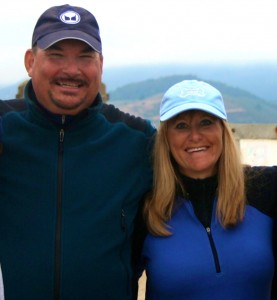
In Boston and New York I had loved going to what is called “the shore,” but what is called the “coast” in California was a mystery to me. I pictured it akin to the one I had grown up with on Cape Cod: stretching for miles, with cliffs of sand tumbling down to the water like drifts of snow. Hot and sunny, just perfect for getting tan. It was my father who taught me to love sailing, but on the Atlantic. I want to live here, I said to my husband, stabbing the map with my finger on that dot called Half Moon Bay. The place with the romantic name.
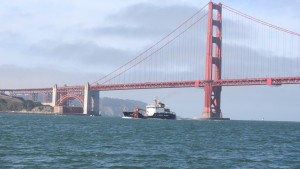
I did not know that California’s Pacific beaches were of brown sand and punctuated with enormous rock formations–sharp protrusions worn smooth by water pounding against them for eons–that stand like monuments to the sea. I did not know that it was often foggy and cold, especially during the months of summer. I did not know that when you sailed the San Francisco Bay you wore a heavy jacket, and had to don gloves and a hat in the fifty-degree wind even on a seventy-degree day. Half Moon Bay was about thirty-five miles south of the Golden Gate Bridge, at least an eight-hour trip when motor-sailing, but the conditions were the very much same.
My husband did not know any of this, either. What he did know and what he did say was this: it’s too far away from where I’m going to work. And so I gave up on Half Moon Bay, never dreaming that someday I would enjoy it from the cockpit and deck of my own sailboat.
Our divorce ten years later eventually brought me the happiness of a second husband and the reality of a once elusive dream: the sloop Brad and I call “Mercy Street.” She was named after my mother’s final book of poetry and my own memoir. Starting in 2002, with a flotilla of friends, Brad and I made the journey south to Half Moon Bay every Labor Day Weekend, with both Gulliver and Breeze in tow.
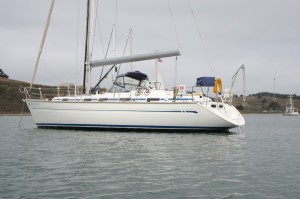
After dropping the right type of boat anchor in Pillar Point’s protected harbor–populated by thousands of seagulls–we would shove the inflatable dingy named Gulliver’s Travels over the life lines into the water, lower its motor and power our way to the sailboats of those we knew, or were just getting to know. Even Breeze and Gulliver loved the ride, their ears flapping and turning inside out in the wind.
Everyone invites you aboard when you hail their boat. Beers and sodas abound. You can stay for hours, talking about anything and everything, in the snug surroundings with tiny kitchens, tiny living quarters, and even tinier nighttime berths.
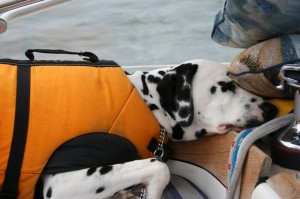
We were lucky enough to be part of a community of sailors, all determined to take advantage of the opportunity for peace, friendship and the time spent bobbing on the boats they loved. Ritual was important: from buzzing others in your dingy even when they might be sleeping, to conversing over bowls of clam chowder in the restaurants ashore, to the final supper picnic on the beach.
Everyone contributed something for the last celebration of the weekend: salmon and halibut, grilled on portable barbecues, caught earlier that same day by the fishing boats now snugged up in the harbor; coolers of beer and wine brought ashore by dinghies low in the water with their burden; homemade potato salad, coleslaw and deviled eggs; steaks for those who didn’t like fish; pasta salad with its green, red and yellow macaroni. Our contribution was always a tub of cold artichokes with curried mayonnaise for dipping, and a big board of cheeses native to California, which inevitably got slightly gritty from the sand carried on the ocean breeze. A feast on the long sea wall at the edge of the surf. Heaven!
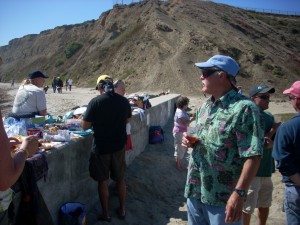
Last year, however, there was little heaven to be had. On our way down, fighting the swells of the ocean, a repetitive beep began to sound from the controls of our binnacle. A message flashed: LOW BATTERY. We relied upon these three enormous batteries to run everything electrical on the boat when we were not plugged into shore power in our berth at the dock: the lights, the refrigerator, the instruments, the anchor winch, the radio, the radar and more. Without the batteries, we were in trouble. Our lights were beginning to dim, and the refrigerator temperature was already on its way up.
We were just able to set the anchor, and then, forgoing the usual opening-day festivities, we called one marine store after another on our cell phones, seeking the proper size and shape batteries–but had no luck. Finally, in the store nearest to Mercy Street’s home marina, we found three compatible with those that were quitting. But how were we going to get them when they were at such a distance?
Our friend, Jerry, worked in the store and we phoned him, asking if he knew anyone who would drive the batteries to us, down the highways and over the mountains, for a hundred dollars or so. It would be at least a six hour round trip.

In the long run, we were both lucky and blessed. In an ultimate act of friendship, Jerry and his wife Mary, gave up their own holiday weekend to purchase the batteries for us and make the trek themselves. However, when they arrived, we all saw, to our frustration, that while the batteries themselves were the right ones, the connections to the terminal posts were of the wrong sort. Mary and Jerry turned right around, drove back to the store, and the next morning rescued us with adaptors for the posts. We took them out to a joyous Mimosa-filled brunch and thanked them over and over again.
As we motored back to Mercy Street, we prayed that the batteries wouldn’t puncture the rubber dinghy, as the three of them weighed ninety-five pounds apiece. They would have to be hefted from the surface of the water and up on to the deck of the bobbing boat, without being dropped into the drink. And from the cockpit, we still had to navigate down the steep companionway staircase to the battery compartment.
Brad and I looked at each other with apprehension. Would we be able to manage it? I was strong, working out at the gym with weights regularly, but I was a 5? 5? woman. This would ordinarily be a job for the greater strength and height of a man–much as the feminist in me hated to admit it. Nevertheless, I was able to take my end of the battery and heft it down the stairs and up over the three-foot side of the battery compartment. Success at last!
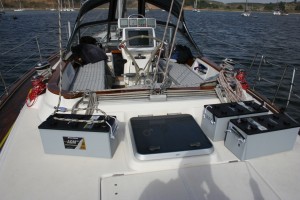
But, no, it appeared not. Brad shortly discovered that the adaptors’ holes were too small. Determined, and by now motivated by desperation, he designed an ingenious plan to enlarge them. Until he remembered that the tool required–a battery-powered drill–was in its usual spot in the garage.
So we’ll borrow one, said I slowly. No, no, said he quickly. In our own ways, we were both loath to ask for help and let anyone know that we had made the mistake of not checking the five-year-old batteries before we left home–to say nothing of not being prepared with something as basic as a drill on a three-day anchor-out. Of course, sometimes all of us feel reluctant to reveal our inadequacies, whether it is to ask directions when lost in a car or for help in finding the ketchup hidden in the ceiling-high shelves of a giant store like Costco.
After a moment or two of rallying myself, I hailed a friend on my cell (no using the radio at this point) and asked for what we needed. Prompt delivery of a cordless drill came via dinghy, but when Brad turned it on, its battery was dead. Undeterred, I tried another sailor we had met only once, and she arrived, this time with a drill that worked. Brad set out, quite handily, to make the connections fit with each other and three hours later, the refrigerator began to hum, the instruments beeped on, and the lights glowed. Guests joined us for a turkey chili dinner supper, and we all celebrated.
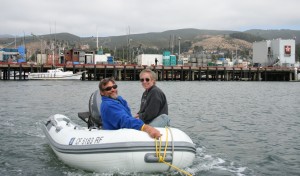
It doesn’t always take a friend to rescue you in a bad situation. Sometimes, it is a stranger in a gas station who knows the road you’ve spent the last hour trying to find. Sometimes, it is learning to tether your precious Dalmatian into the cockpit so that he doesn’t slide into the ocean when the boat heels. Sometimes, it is forcing yourself to call Vessel Assist for a tow, when your engine quits because you left a line dangling overboard and it wraps itself around the propellor. We all make mistakes. But it requires allowing yourself to be vulnerable enough to admit some sort of failure, whether small or large, to get the assistance or advice you need. Acknowledging ignorance is often perceived as weakness. In the end, perhaps we have to humble ourselves a bit in order to solve the problem confounding us.
Brad and I have at last learned that others do respond, often quite gladly, happy to be of service. We, too, have helped both friends and strangers alike and been the better for it. Several years before the one I have written of here, we had towed friends back to their boat when the engine in their dinghy failed. Mary and Jerry worked a miracle for us by sacrificing a weekend of their own, and all of the others who also came to our aid formed a bond with us: you need and I give–and this drew us closer. Every sailor has stories to tell of the novice mistakes he made along the way to being more seasoned, and thus are stories created that bring laughter and friendship.
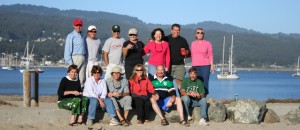
We only need to accept that a bit of humility can bring us the help we need, and at the same time sharpen our knowledge of ourselves. We will be able to find the ketchup in Costco, or never get lost along that one particular road again, or ever forget to tether our dog into the boat. Ask for help, and you will receive. And in this way we grow, having exposed ourselves enough to take the risk of learning something new.
As Sigmund Freud once said, “out of your vulnerabilities will come your strength.” Amen to that.
Yours,
Linda
Have a comment or feedback? Talk to Linda!

